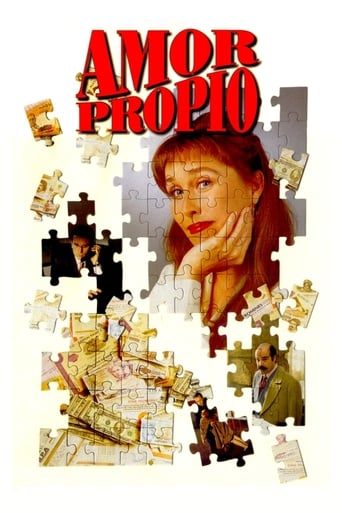

good film but with many flaws
... View MoreThis is one of the few movies I've ever seen where the whole audience broke into spontaneous, loud applause a third of the way in.
... View MoreThe storyline feels a little thin and moth-eaten in parts but this sequel is plenty of fun.
... View MoreThe movie really just wants to entertain people.
... View More¨Amor Propio¨ whose international title is ¨Self-steem¨ or ¨Courage¨ contains a suspense story , intrigue , betrayal and ordinary noir plot characteristics . It deals with a brave woman , an appealing heroine married to a bank director sees how her life is destroyed in a matter of hours when the police discovers that her husband has escaped with money from the bank . As Juana (Verónica Forque) is placed in a desperate position when her husband Simon (Antonio Valero) , a frequenter of Spain's high finance inner circles , disappears . There then happens a multi-million dollar scam . Juana is submitted to a threatening interrogation carried out by a couple of suspect men , and later on , it occurs the sudden encounter with an friend (Tito Valverde) who helps her . Everyone , strange mobsters (Ramon Langa) , cops , relatives (Antonio Resines) and bankers (Carlos Ballesteros , Helio Pedregal) want something from Juana , but she knows nothing and refuses to lose faith in her beloved hubby . Things change , however , when Juana discovers that Simon has a mistress (Anabel Alonso) . Suddenly, it's pay back time . The husband's robbing returns as if it were a nightmare , forcing the starring to return to be one person who thought she had given up . Here Mario Camus develops as a noir thriller with suspense , thrills , double and triple-crosses , twists and turns . It's a hard task to pay homage to a movie style while simultaneously spoofing it . However, director Mario Camus establishes the appropriate tone , leading to a passable romp through familiar-seeming territory that is subtly transformed by his lighthearted elements . But the whole film lacks aspects that I consider relevant ; furthermore , being slow-paced , and some boring . This is an interesting but slow-moving drama concerning on a few roles who suffer the consequences of their dark actions . Don't expect the traditional suspense movie here , the result is a picture that never takes itself too seriously , and , consequently , tuns out to be a passable and acceptable fare . I welcome the sublime simplicity with which the flick is treated and with that appealing screenplay based on real events , in fact , it happened in city of Santander when a Bank Popular clerk chief stole a lot of money from humble as well as wealthy people and subsequently fleeing to South America . The script takes us into the human reality on these characters, victims of their own ambitions and distresses ; it is the way in which Camus brings to life the interesting as well as slow tale . The finale is such a craftsmanship of timing and trickery that it may be intriguing even for suspense veterans . And the main strength of the film, resides on the adjusted interpretations proceeded by a nice trio : Veronica Forque , Tito Valverde , Antonio Resines . Being mainly performed with unbridled energy and enthusiasm by helium-voiced Veronica Forque who must suffer consequences when her hubby escaped apparently with a lot of money . Her character shuns anything remotely dark and is far from the customary Femme Fatale , ordinary role in Noir Cinema , in fact , she is sympathetic and charming . It stands out the gray atmosphere that provides cinematography by Jaume Peracaula . It results to be atmospheric though worn-out ; however , an alright remastering being necessary . Downbeat and sad soundtrack score by Sebastian Marine , Mario Camus's ordinary , composed by piano and other musical instruments ; as he creates a somber and evocative atmosphere . The motion picture was professionally directed by Mario Camus following his particular style . Camus was born in Santander , Cantabria , location in which often shoots his films . He worked with Carlos Saura in several screenplays during the early 60s Los Golfos (1960), Llanto Por Un Bandido (1964)), and also directed some shorts. His first feature films were Los Farsantes (1963) and Young Sánchez (1964), a movie about boxing which won the Best Film Award at the Buenos Aires Festival . Mario has an important career with film and television adaptations quite remarkable , as he efficiently directed yarns based on notorious writers such as Perez Galdos, García Lorca, Cela Camilo José Miguel Delibes . During various decades he touched styles varying from romantic comedies and musicals to splendid adaptations from famous novels, as is the case of the prestigious TV series "Fortunata y Jacinta" (1979) . In 1983 he was given the 'Medalla Oro De las Bellas Artes' (Arts Gold Medal), and one year later he prepared his most successful work both with public and critic : Los Santos Inocentes (1984), an adaptation from the novel by Miguel Delibes. Mario is an expert on interesting dramas as proved in ¨ The house of Bernarda Alba¨ , ¨La Colmena¨ which won the Golden Bear Award at the Berlin Film Festival , ¨The days of the past ¨ and many others . Rating : Acceptable and passable ; it's a decent film though sometimes slow-moving .
... View More